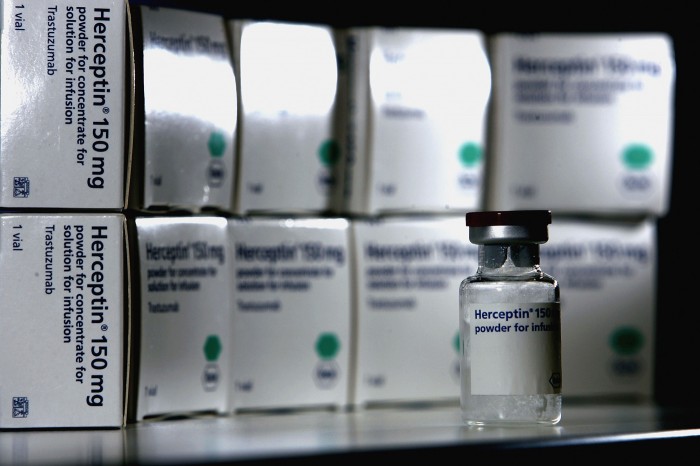Precision Medicine Pioneer
Herceptin is the original targeted drug therapy. The medication, which targets the HER2 protein associated with an aggressive form of breast cancer, was developed by the biotech company Genentech and won approval from the U.S. Food and Drug Administration in 1998. It has been used to treat more than two million patients worldwide and has generated global sales of more than $64 billion for the Swiss pharma giant Roche, which owns Genentech and markets Herceptin outside the U.S. Here’s how the pioneer of precision medicine has evolved.

1985
National Institutes of Health shows that HER2 gene is frequently amplified in human breast tumor cells.
1990
Genentech scientists, having cloned the first human HER2 gene earlier, create Herceptin by humanizing a mouse antibody directed at HER2. Third parties later estimate Genentech’s development costs to be $150 to $200 million.
1992
Genentech requests authorization from the FDA to administer Herceptin as an investigational drug.
1992–1998
Clinical trials look at the safety and efficacy of Herceptin alone or with chemotherapy for people with HER2-positive metastatic breast cancer.
March 1998
Genentech announces collaboration with diagnostics company Dako to develop commercial test to identify patients who overexpress HER2.
May 1998
Genentech requests FDA permission to market Herceptin. FDA designates it a “Fast Track” and “Priority Review” product, which means it fills an unmet medical need for a serious condition and will be reviewed within six months rather than the standard 10.
September 1998
FDA approves Herceptin for the treatment of HER2-positive metastatic breast cancer and approves a diagnostic test to help identify patients.
August 2000
First European approval.
2006–2008
FDA approves three different Herceptin-based regimens for post-surgery treatment of early-stage HER2-positive breast cancer. Approval for gastric cancer follows.
2014
First patent for Herceptin expires in Europe. Following the lead of an Indian biotech firm that got a highly similar version of the drug approved in 2013, a South Korean company receives approval for a “biosimilar” that shows no clinically meaningful difference in safety or effectiveness from the original product. Other Asian approvals follow.
May 2015
Shortly after President Obama announces his $215 million research project on precision medicine, the World Health Organization adds Herceptin to its list of essential medicines for low- and middle-income countries.
2019
First patent for Herceptin is scheduled to expire in the U.S.
Keep Reading
Most Popular
Large language models can do jaw-dropping things. But nobody knows exactly why.
And that's a problem. Figuring it out is one of the biggest scientific puzzles of our time and a crucial step towards controlling more powerful future models.
The problem with plug-in hybrids? Their drivers.
Plug-in hybrids are often sold as a transition to EVs, but new data from Europe shows we’re still underestimating the emissions they produce.
How scientists traced a mysterious covid case back to six toilets
When wastewater surveillance turns into a hunt for a single infected individual, the ethics get tricky.
Google DeepMind’s new generative model makes Super Mario–like games from scratch
Genie learns how to control games by watching hours and hours of video. It could help train next-gen robots too.
Stay connected
Get the latest updates from
MIT Technology Review
Discover special offers, top stories, upcoming events, and more.